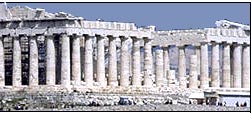Spain, one of the largest countries in Europe, occupies four-fifths of the Iberian Peninsula. A land of extraordinary geographical and cultural diversity, it has much to offer the tourist. While the Mediterranean beach resorts on the Costa Blanca, Costa Brava and Costa del Sol continue to attract sun-seekers, the north coast is gradually gaining in popularity. But there is a great deal more to Spain than the beaches. The terrain is amazingly diverse with a huge variety of landscapes: deciduous and coniferous forests, arid plains, salt marshes, rocky bays and coves, peaks, verdant river valleys and mountain streams.
One of the most pleasurable ways to discover Spain 's natural beauty and abundant wildlife is to visit one of the National Parks. Walks, hiking trails and jeep excursions enable visitors to explore marshes and wetlands, coastal dunes, isolated mountain peaks and Atlantic beaches. At certain times of the year the skies are filled with migrating birds heading for North Africa and the parks are also the habitat of a wealth of indigenous flora and fauna. Special mention should be made of rare and endangered species like the royal eagle, the capercaillie (woodcock) and the Pyrenean mountain goat.
Over the centuries, Spain's indigenous and conquering peoples have left an indelible legacy. Cromlechs and cave paintings from the prehistoric period, temples and aqueducts from the Roman occupation, Romanesque churches, Moorish baths, mosques and fortresses, medieval cathedrals and castles, Renaissance and Baroque palaces, the modernist architecture of Antoni Gaudí and his contemporaries, as well as present-day masterpieces like the Guggenheim museum in Bilbao and the City of Arts and Sciences in Valencia. |







